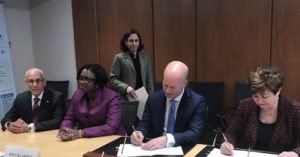WASHINGTON – The great reconstruction of St. Maarten can finally start. The Netherlands has signed a final agreement with the World Bank for managing a multi-million fund. As of today, 112 million euros have been made available for urgent projects and programs.
The intention is for the government of St. Maarten to come up with plans to repair the infrastructure and buildings that have been damaged and, above all, to make them more resistant to heavy hurricanes.
On Monday, Raymond Knops, the state secretary of kingdom relations, signed on behalf of the Netherlands in Washington. A maximum of 470 million euros will be sent to the World Bank in stages, which will then monitor the money on behalf of the Netherlands and will help to implement the projects.
How are all those millions spent?
|
Outgoing Prime Minister of St. Maarten, Leona Marlin-Romeo, calls it an ‘important step forward’ to rebuilding St. Maarten and ‘improved to its status as beacon of prosperity’.
Create and execute plan
The World Bank has experience with both reconstructions after natural disasters and in the Caribbean region.

Signing in Washington Foto:World Bank
The Netherlands has given the World Bank a prominent role to ‘objectively assess and tackle projects’. The World Bank will help the Government of St. Maarten, for example, to set up projects and establish priorities.
A special committee assesses whether the plans and projects that St. Maarten submits may also be implemented and determines which companies may carry them out. Steering committee members include representatives from St. Maarten, the Netherlands and the World Bank. On behalf of the
Netherlands, Frans Weekers also partakes in this committee. For example, the steering committee looks at whether a project is really necessary. Also important is sustainability, as in the future the infrastructure of the island must be able to cope with strong hurricanes. Other parties such as foundations and international organizations can also submit plans.



